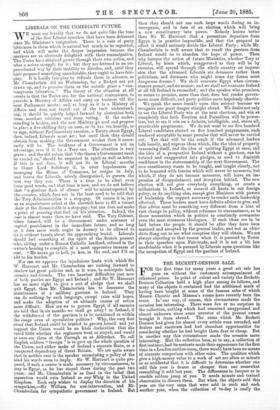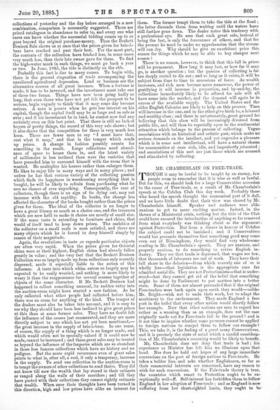THE BECKETT-DENISON SALE. F OR the first time for many years
a great art sale has gone on without the customary accompaniment of enhanced prices. In point of extent and variety the BeckettDenison Collection held a high place among its fellows, and many of the objects it contained had the additional mark of having been bought at some of the famous sales of which Messrs. Christie and Manson's rooms have recently been the scene. In"; one way, of course, this circumstance made the occasion less interesting. There were few or no surprises in the collection, nothing which had remained unappraised and almost unknown since some ancestor of the present owner brought it from abroad. The sums which Mr. Beckett Denison had given for almost every article were recorded, and dealers and amateurs had had abundant opportunities for considering whether he had bought them dear or cheap. But in another way this circumstance made the occasion more interesting. Had the collection been, so to say, a collection of first instance,had its contents made their appearance for the first time in a London auction-room, there would have been no means of accurate comparison with other sales. The qualities which give a high-money value to a work of art are often so minute or so accidental that it is difficult to determine whether one sold this year is dearer or cheaper than one somewhat resembling it sold last year. The differences in lacquer or in crackle seldom jump at you. It needs minute and trained observation to discern them. But when the objects sold this year are the very same that were sold in such and such another year, when the collection of to-day is really the
collections of yesterday and the day before arranged in a new combination, comparison is necessarily suggested. There are priced catalogues in abundance to refer to, and every one who cares can know whether the successful bidding comes up to or goes beyond the original purchase-money. Thus the Beckett Denison Sale shows us at once that the prices given for bric-abrae have reached and past their best. For the most part, the contents of the collection have fetched less, in some cases very much less, than their late owner gave for them. To find the high-water mark in such things, we must go back a year or two. In June, 1885, the tide is distinctly on the ebb.
Probably this fact is due to many causes. To begin with, there is the general stagnation of trade accompanying the unrelieved agricultural depression. Land or business are the alternative sources of all great incomes. When a fortune is made, it has to be invested, and the investment must take one of these two forms. Things have now been going badly so long, that even those who have not yet felt the prospect to be serious, begin vaguely to think' that it may some day become serious. A man is poorer when he gets less interest on his capital, though the capital itself may be as large and as safe as ever ; and if his investment be in land, he cannot now feel any certainty even on this last point. That there is still no lack of buyers of pretty things, the record of this very sale shows ; but it also shows that the competition for them is very much less keen. There are fewer men to say I must have that, cost what it may," and that is the temper which sends up prices. A change in fashion possibly counts for something in the result. Large collections need abund ance of space to house them in, and the latest variety of millionaire is less inclined than were the varieties that have preceded him to surround himself with the room that is wanted. He multiplies his houses rather than enlarges them. He likes to enjoy life in many ways and in many places ; and unless he has that curious variety of the collecting passion which finds its happiness in warehousing everything that is bought, he will be likely to refrain from purchasing what he sees no chance of ever unpacking. Consequently, the race of collectors, though there is no sign of its dying out, may not increase with the old rapidity. In books, the change has affected the character of the books bought rather than the prices given for them. The ideal of the collector is no longer to have a great library so much as a choice one, and the treasures which are now held to make it choice are mostly of small size. If the same taste is extending to furniture and china, that would of itself tend to keep down prices. The ambition of the collector on a small scale is soon satisfied, and there are many objects which he is forced to deny himself simply by reason of their magnitude.
Again, the revolutions in taste as regards particular objects are often very rapid. When the prices given for Oriental china were at their highest, English china had already fallen greatly in value ; and the very fact that the Beckett Denison Collection was so largely made up from collections only recently dispersed, made it especially liable to the action of this influence. A taste into which whim enters so largely may be expected to be easily wearied, and nothing is more likely to weary it than the reappearance for several seasons together of objects of the same character. If Mr. Beckett Denison had happened to collect something unusual, its sudden entry into the auction-room might have started a new fashion. As he only collected what other people had collected before him, there was no room for anything of the kind. The temper of the dealers must also be taken into account, and it is easy to see why they should have been leas inclined to give great prices at this than at some former sales. They have no doubt felt the influence of the causes just enumerated, and they are more directly subject to one which has not yet been mentioned,— the great increase in the supply of bric-a-brac. In one sense, of course, the supply of a thing which is no longer made, and which would often not be specially valued if it could now be made, cannot be increased ; and these great sales may be treated as beyond the influence of the forgeries which are so abundant in those less famous collections which have no history and no pedigree. But the more rapid recurrence even of great sales points to what is, after all, a real, if only a temporary, increase in the supply. To send one collection to the auction-room is to tempt the owners of other collections to send theirs. They did not know till now the wealth that lay stored in their cabinets or ranged along the walls of their corridors ; and till they have parted with their collections they cannot rightly estimate that wealth. When once their thoughts have been turned in this direction, high and low prices have alike an interest for
them. The former tempt them to take the tide at the flood ; the latter dissuade them from waiting until the waters have still further gone down. The dealer notes this tendency with a professional eye. He sees that each great sale, instead of being the last, is only the forerunner of others, and that for the present he need be under no apprehension that the stream will run dry. Why should he give an exorbitant price this season for things which he may be able to buy cheaper next season ?
There is no reason, however, to think that this fall in prices will be permanent. How long it may last, or how far it may go, is another question ; but the passion of collecting is far too deeply rooted to die out ; and so long as it exists, it will ba subject from time to time to accessions of force. As wealth increases, and rich men become more numerous, the power of gratifying it will increase in proportion, and by-and-by, the collections immediately likely to be offered for sale will all. have come into the market, and the demand will again be in excess of the available supply. The United States and the older English Colonies are likely to help on this process. Time will increase in the one, and in the other give birth to, a leisured and wealthy class ; and there is, unfortunately, great ground for believing that this class will be increasingly divorced from public life, and will thus he especially open to the sentimental attraction which belongs to the process of collecting. Vagu&. associations with an historical and artistic past, which make no serious demands on the intellect, and yet engender a pleasure which is in some sort intellectual, will have a natural charm. for communities at once rich, idle, and imperfectly educated ; and associations of this sort are just those which are aroused.. and stimulated by collecting.



































 Previous page
Previous page